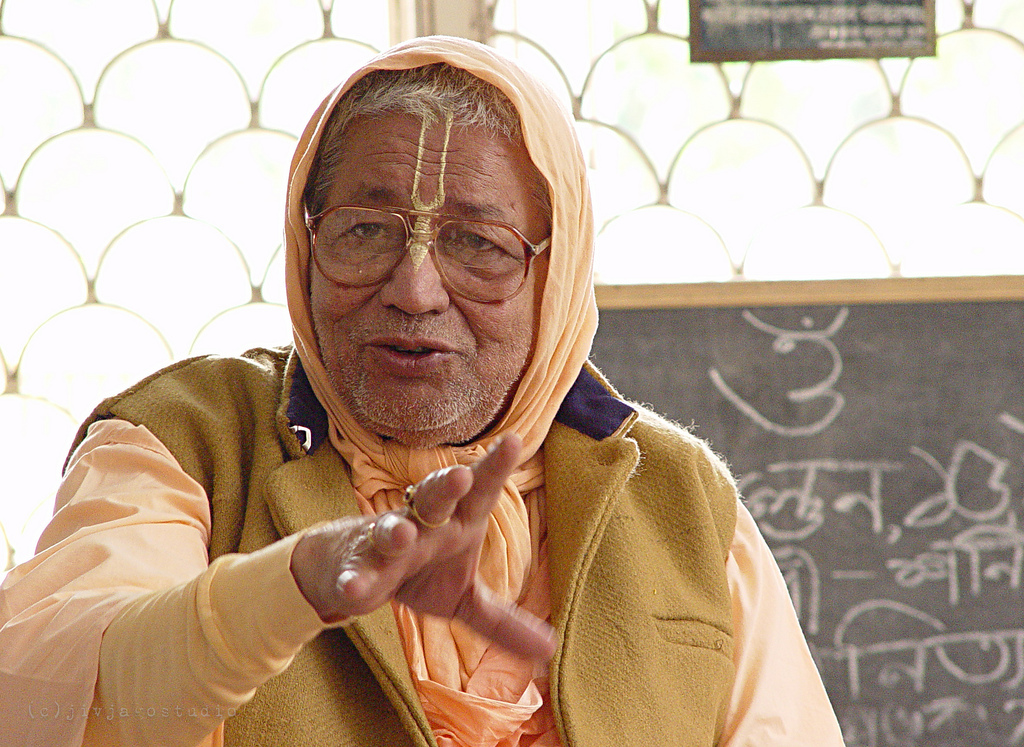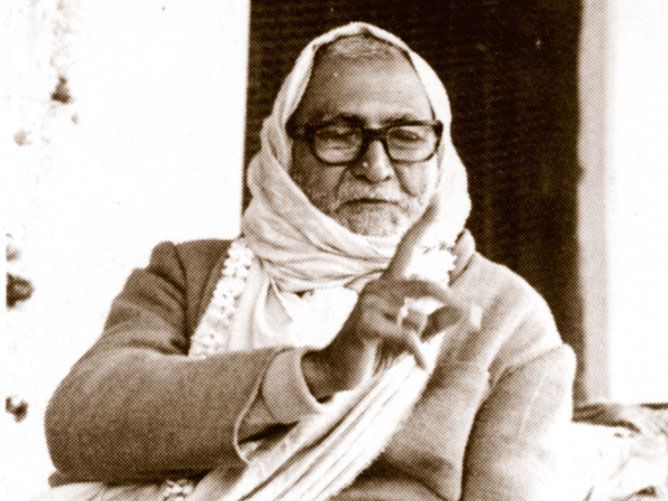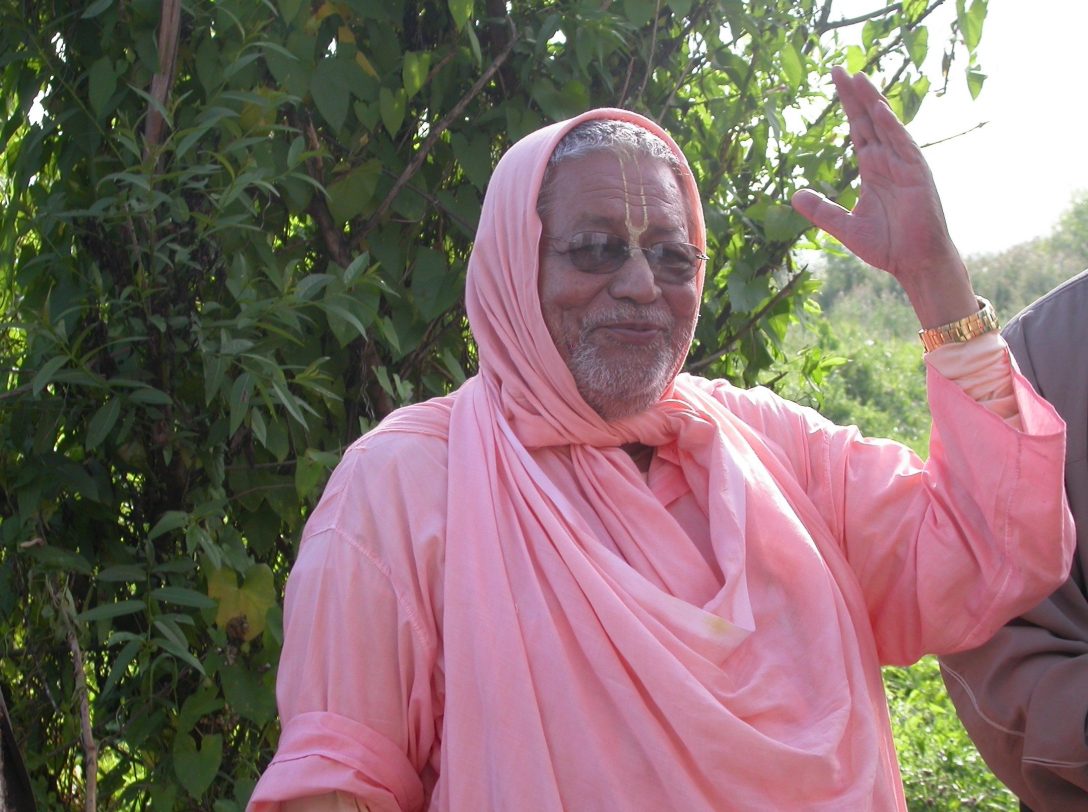by Srila Bhakti Sundar Govinda Deva-Goswami Maharaj. Speaking on 16 January 2006 from Sri Nabadwip Dham.
“For two or three days I have been thinking of how I can say this to the devotees: I am trying as possible, and they must also try as possible; but the cheṣṭā, the trying attitude, must be perfect, otherwise we will cheat our own selves.”
We cannot say that we are always expert and firm in Kṛṣṇa consciousness, but we are trying. That is the nature of the Vaiṣṇava. The Vaiṣṇava is always saying, “I want to be a servant of the servant of the servant.” It is necessary to be more and more conscious about this matter. For two or three days I have been thinking of how I can say this to the devotees: I am trying as possible, and they must also try as possible; but the cheṣṭā, the trying attitude, must be perfect, otherwise we will cheat our own selves. This is very exclusive, but important for everyone.
What is religion? This is the first thing. Religion has so many forms, because people have so many natures. Not only humans, but dogs, cows, elephants, lions, tigers, jackals—everyone has some nature, and the jīva-soul is living everywhere. But religion is one for everyone. That is very important to consider.
We cannot get the human body easily.
bahūnāṁ janmanām ante jñānavān māṁ prapadyate
vāsudevaḥ sarvam iti sa mahātmā sudurlabhaḥ
(Śrīmad Bhagavad-gītā: 7.19)
Bahūnāṁ janmanām ante: so many births have passed before, and then by sukṛti, by good fortune, by the mercy of the servitors of the Lord, the Vaiṣṇavas, by the mercy of Guru—through so many channels the merciful rain has come to us, and we have got this human body.
There are 400,000 species of humans; but Mahāprabhu said,
bhārata-bhūmite haila manuṣya-janma yāra
janma sārthaka kari’ kara para-upakāra
(Śrī Chaitanya-charitāmṛta: Ādi-līlā, 9.41)
[“One who has taken his birth as a human being in the land of India should make his life successful and work for the benefit of all other people.]
Everywhere in this world there are many species of humans, but that is not sufficient: who has taken birth in Bhārat [India], where the earth is fertile for religion, where the Veda, Vedānta, and Upaniṣads appeared, where āmnāya—the knowledge that descends from the transcendental world through some particular qualified soul—appears, and where God, Lord Kṛṣṇa Himself, appeared in different incarnations; who receives the manuṣya-janma, the human body, here, has more fortune. Mahāprabhu clearly told this to us.
We see that in India there are so many religious ideals: māyāvad, viśiṣṭādvaitavād, Vaiṣṇavism, Madhvāchārya, and so on—so many. Jungle religion, village religion, and city religion take different forms in India, but the pure religious ideal is given in the Vedas, Vedānta, and Upaniṣads, and in a historical form in the Mahābhārata. There is an expression: yā nei Mahābhārate tā nei Bhārate, yata āchhe Mahābhārate sakala-i āchhe Bhārate. “What is not in Mahābhārata, that is not in India, and what is in Mahābhārata, that is all in India.” Then, we can believe that religion is full-fledged in Mahābhārata.
Who has given that to us? We have got some consciousness about different ideals of dharma, religion, but the giver is Vedavyās. Through Vedavyās we have got the knowledge of the Veda, Vedānta, Upaniṣad, and so on. Finally, however, Vedavyās was not happy, because Vedavyās knew, “What I am giving is not palatable for everyone; it is the medicine for sick men, medicine for poor persons, but not medicine for healthy persons.” He did not know how to give this, and for that reason he was very unhappy. “I have given everything. I have given Mahābhārata: inside of that is Śrīmad Bhagavad-gītā, and we can say that the gist of Mahābhārata and the gist of knowledge is within Śrīmad Bhagavad-gītā. That has also been given.” But it was not given in a full-fledged way. In the battlefield you cannot say how the gopīs played with Kṛṣṇa! He indicated that as it was possible, but he knew it was not sufficient. He was thinking about this and then through telepathy his Gurudev Nārad Goswāmī came in front of him and asked,
“How are you?”
Vedavyās said, “Well, Prabhu, I am just thinking about your lotus feet, because I am not happy. I am not well. Physically I have no disease, but mentally I am unsatisfied.”
And Nārad Goswāmī said, “I understand that. For that reason I have come to see you, to give some nourishment to you.”
“What, Prabhu, you know my situation?”
“Yes, I know!”
jugupsitaṁ dharma-kṛte ’nuśāsataḥ
svabhāva-raktasya mahān vyatikramaḥ
yad-vākyato dharma itītaraḥ sthito
na manyate tasya nivāraṇaṁ janaḥ
(Śrīmad Bhāgavatam: 1.5.15)
[The people in general are naturally inclined to enjoy, and you have encouraged them in that way in the name of religion. This is verily condemned and is quite unreasonable. Because they are guided under your instructions, they will accept such activities in the name of religion and will hardly care for prohibitions.]
“What can I say to you? You have given everything, but it has not properly manifested, and it will not enter into the heart of everyone, because they do not even know where they are living! You need to settle them; they need to stand in their own land, and then you can give them everything else. They have no land, they are refugees here; you have given them some food, some dress, etc. but they have not got proper accommodation.
You have given,
naiṣkarmyam apy achyuta-bhāva-varjitaṁ
na śobhate jñānam alaṁ nirañjanam
kutaḥ punaḥ śaśvad abhadram īśvare
na chārpitaṁ karma yad apy akāraṇam
(Śrīmad Bhāgavatam: 1.5.12)
[Knowledge of self-realisation, even though free from all material affinity, does not look well if devoid of a conception of the Infallible [God]. What, then, is the use of fruitive activities, which are naturally painful from the very beginning and transient by nature, if they are not utilised for the devotional service of the Lord?]
When he received these special teachings from Nārada Goswāmī, Vyāsadev meditated; Nārada had also told him, “I am giving this mantram, this knowledge to you, and if you meditate on it, it will reveal itself to you.” Then Vyāsadev meditated and he saw,
bhakti-yogena manasi samyak praṇihite ’male
apaśyat puruṣaṁ pūrṇaṁ māyāṁ cha tad-apāśrayām
(Śrīmad Bhāgavatam: 1.7.4)
[Thus he fixed his mind, perfectly engaging it by linking it in devotional service [bhakti-yoga] without any tinge of materialism, and thus he saw the Absolute Personality of Godhead along with His external energy, which was under full control.]
Vyāsadev saw the position of the Supreme Personality of Godhead, His paraphernalia, His devotees, His chit-śakti, His jīva-śakti, His māyā-śakti—everything. Then by the grace of his Gurudev Nārada Goswāmī, he composed the Śrīmad Bhāgavat. ‘Composed’ means that he explained what knowledge he received from Nārada Goswāmī. Then he wanted to distribute that knowledge to others, but he considered: previously he gave so much knowledge to everyone, and now he wanted to give something new, some correction, so who, better than him, could present this knowledge? Then he remembered Śukadev. Only that boy, strī-pum-bhidā na tu sutasya vivikta-dṛṣṭeḥ [“who is so pure that he does not distinguish between male and female bodies” SB: 1.4.5], only that boy can give it. Then he searched for his own boy, Śukadev.
Śukadev had forgotten everything. Pariniṣṭhito ‘pi nairguṇye: he was always existing on the platform of transcendental knowledge. But Vedavyās searched for him and gave him that knowledge, and Śukadev Goswāmī distributed that knowledge in Parīkṣit Mahārāj’s assembly; then Sūta Goswāmī spoke that at the meeting of 60,000 ṛṣis. Vedavyās then composed the full history of Kṛṣṇa-līlā, of that divine abode, and so many beautiful things. Vyāsadev collected everything and gave it to Śukadev; Śukadev gave everything; and then Vyāsadev composed everything and gave it to us, in the divine form of Śrīmad Bhāgavat.
Vyāsadev mentioned that Śrīmad Bhāgavat is the divine form of Lord Śrī Kṛṣṇa, the Supreme Personality of Godhead: padau yadiyau prathama dvitīyau (“The first and second cantos are His two feet.” —Padma-purāṇa), and so on.
kṛṣṇe sva-dhāmopagate dharma-jñānādibhiḥ saha
kalau naṣṭa dṛśām eṣa purāṇārko ’dhunoditaḥ
(Śrīmad Bhāgavatam: 1.3.43)
[“After Lord Kṛṣṇa departed for His abode along with religious principles and transcendental knowledge, this Purāṇa, Śrīmad-Bhāgavatam, has arisen like the sun in this Age of Kali to enlighten those who have no spiritual vision.”]
These are all historical matters, which you know already. What I want to say, what I have been thinking about how to present to you all for two or three days—and it is necessary to follow what I shall say now, that will be so important and so good for my friends—that is, dharma, what I started with: what kind of dharma are we practising?
dharmaḥ projjhita-kaitavo ‘tra paramo nirmatsarāṇāṁ satāṁ
(SB: 1.1.2)
[Here, the highest dharma, in which cheating is utterly rejected, is given for the sadhus who are free from envy.]
That religion: we are the practitioners of Kṛṣṇa consciousness, that divine form of religion. That is dharma. Projjhita-kaitavo: we have been given so many explanations from our preceptors, but the main thing we must avoid is kaitava, cheating. And, paramo nirmatsarāṇāṁ satāṁ: we must not be envious. This is the vital point. Paramo nirmatsar: be that kind of sādhu, that kind of practitioner. Envy is very bad.
We are searching for our spiritual life, which is clean from jñāna-karmādy anāvṛtam [the coverings of jñāna and karma]. Ānukūlyena Kṛṣṇānuśīlanaṁ bhaktir uttamā [“The highest type of devotion is cultivated according to Kṛṣṇa’s satisfaction.” Brs: 1.1.11]. We want to worship our Lord with love and affection. With love and affection: this is the very vital point, because otherwise we cannot be engaged fully, and that is necessary. This is the first thing. And the second thing is: do not be envious. It is harmful for our spiritual movement, our spiritual life. It is very harmful and you must avoid that.
You are all very qualified and very clean-hearted personalities, born in the Western world, because you do not know what is what but you have joined by your sukṛti. Your good fortune is behind you, pushing you, and you have joined in Kṛṣṇa consciousness. Kṛṣṇa consciousness can reveal everywhere and you have all had this opportunity. But the obstacle is envy, so do not be envious of others, and always be affectionate and loving. Have a ‘loveful’ heart. Mahāprabhu said everyone should be merciful. Jīve doyā, Nāme ruchi, Vaiṣṇava-seva: serve the Vaiṣṇavas, chant the Holy Name of Lord Kṛṣṇa with love and affection, and be merciful to everyone. In this way proceed in the line of Kṛṣṇa consciousness. That is the real religion of the jīva-soul.
Vedavyās said it! Projjhita-kaitavo ’tra paramo nirmatsarāṇām. This gives us the opportunity to receive more and more promotion from this environment. We can very easily cross the specific gravity of the illusory environment. Everywhere there is some specific gravity and we can avoid that specific gravity and that illusion.
Dhṛ dhātu man dharma: dharma can hold us and give us firmness. Holding is necessary for any substance. Our position must be substantial, and that will develop if we can practise Kṛṣṇa consciousness with love and affection. Submission is the first condition and that is the launching pad from where we will throw ourselves. That launching pad must be substantial.
‘śraddhā’-śabde — viśvāsa kahe sudṛḍha niścaya
kṛṣṇe bhakti kaile sarva-karma kṛta haya
(Śrī Chaitanya-charitāmṛta: Madhya-līlā, 22.62)
[Sraddha means confident, firm faith that all activity is fulfilled through devotion to Krishna.]
This is necessary.
When I hear that other institutions are getting some joy in the line of preaching Kṛṣṇa consciousness, I feel a joyful heart, and through that I think I have got some more nourishment from this world. Otherwise how is it possible that our Mission is spreading around this world, especially to some of the atheistic countries, like Russia, like Hungary, like China, like Poland?
My days are passing and I see and feel that I will leave very soon. All my friends and family and the devotees of Śrīla Guru Mahārāj are proceeding, but I want them to be very serious about their practising life. Within this religion that they have taken, Mahāprabhu’s three directives are living and they must follow these. There is no other way!
tṛṇād api su-nīchena taror iva sahiṣṇunā
amāninā māna-dena kīrtanīyaḥ sadā hariḥ
[“The Lord’s Name is to be always chanted by one who is more humble than a blade of grass, tolerant like a tree, free from desire for respect, and who offers respect to others.”]
Hari-kīrtan is most essential. It is not necessary for us to capture a Ganges full of scriptures in our brain. At present Mahāprabhu has given us Hari-nām.
nāmaikaṁ yasya vāchi smaraṇa-patha-gataṁ śrotra-mūlaṁ gataṁ vā
śuddhaṁ vāśuddha-varṇaṁ vyavahita-rahitaṁ tārayaty eva satyam
(Padma-purāṇa)
[If a devotee once utters the Holy Name of the Lord, or if it penetrates his mind or enters his ear, which is the channel of aural reception, that Holy Name will certainly deliver him from material bondage, whether vibrated properly or improperly, with correct or incorrect grammar, or properly joined or vibrated in separate parts.]
If we proceed with offence then the result will not come quickly, but if we will proceed in our line without offence we will get the result very quickly. Rūpa Goswāmī Prabhu said this. Then we will try as much as possible.
Our religion is Bhāgavat-dharma, Vaiṣṇava-dharma, jaiva-dharma. That is our religion. There are eighty-four hundred thousand species in this world; we are one of those species and we have received a super-chance, because we have the lotus feet of Śrī Chaitanya Mahāprabhu, who is the nondifferent form of Śrī Śrī Rādhā-Kṛṣṇa. At least we heard the name of Śrī Chaitanyadev!
We have this opportunity, and you are present here in Nabadwīp Dhām, so you must try to observe the mood of devotion of Śrī Chaitanya Mahāprabhu, His teachings, His divine mission, and activity.
Mahāprabhu said,
pṛthivīte āchhe yata nagarādi-grāma
sarvatra prachāra haibe mora nāma
(Śrī Chaitanya-bhāgavat: 4.126)
[“My name will be spread in every town and village in the world.”]
Now that is happening: everywhere, in every country, people are chanting and dancing. When I see the list of our ashrams worldwide I am surprised. You are all so fortunate and great, because Kṛṣṇa Himself has entered into your heart, and He will not leave you. You also cannot leave Him, whatever situation will come in your life. But you must be merciful to everyone and continue your spiritual life.



